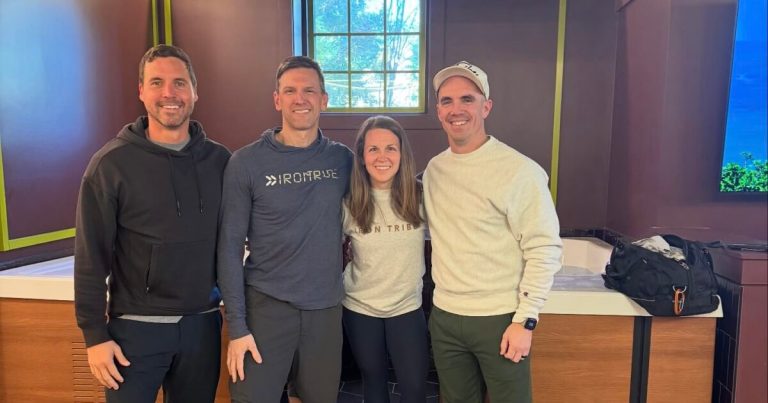Reviewed by: Callie Puryear
Addiction is an equal opportunity disease—how to get help in Birmingham
Reading time: 6 minutes
Sponsored

When most people think of drug or alcohol addiction, stereotypes spring to mind. But the reality is way more complex—according to JR Curbow, Bradford Health Services‘ VP of Admissions, “addiction is an equal opportunity disease,” meaning it can happen to anyone, in any family. We asked when to reach out for help and what happens when you call in Birmingham. Here’s what he told us.
When should you reach out for help?

Y’all know we love to meet up with people for a drink in and around Birmingham, and usually, the occasional social drink isn’t a problem. But there are certain situations where what started as social drinking could turn into something that really is a problem, and it’s important to know the warning signs of possible addiction—including withdrawal symptoms.
It’s important to note that addiction can affect people with happy families and successful careers or those that have experienced trauma. It doesn’t discriminate based on financial situation, education level, race, religion, marital status or gender.
Addiction warning signs
These can include:
- Changing friends, peer group +/or relationships
- Changing jobs
- Isolating from friends + family
While any one of these alone could be benign, the combo may point to a problem.

Alcohol addiction
Look at the above warning signs plus:
- Binge, solitary +/or increased drinking
- Diverting funds to pay for addiction
- Having to take Ubers home because you’re inebriated + can’t drive
“It’s one thing to have a glass of wine at dinner. However, drinking in moderation can easily progress to the point that you’re waking up late, calling in sick for work, or taking PTO to cover the days when you have to rebound.
It’s important to pay attention to the amount of alcohol you are drinking as well. If you’re having four or six beers instead of the two you’ve always had when hitting the town with friends—that can be a warning sign.”
JR Curbow, VP of Admissions, Bradford Health Services
Drug addiction
A few drug-seeking behaviors are telltale warning signs:
- Taking more than the prescribed dosage + running out before the end of the prescription
- Calling the doctor ahead of time to ask for refills
- Borrowing prescriptions from friends + family or hitting up someone else’s medicine cabinet
The bottom line
“Do not wait for consequences before making a call. Call early and get help before you lose control of your habits.
Many people do not decide to get the help they need until the impact on their lives has become severe. Do not be afraid to seek help before your drinking and drug use becomes uncontrollable or unsustainable.”
JR Curbow, VP of Admissions, Bradford Health Sesrvices
How can you tell if a problem is getting worse?

If you typically have a drink or use drugs when you get home and then skip a day, pay attention to what happens. Potential withdrawal signs include:
- Severe persistent headache
- Sweats +/or chills
- Nausea, diarrhea +/or stomach upset
- Acid reflux
- Heart palpitations
“Withdrawal symptoms are a common indicator that your body has developed a reliance on your substance of choice. You may also begin to see changes in your personal and professional life. Your relationships become strained, responsibilities are put off and decisions begin to revolve around your use.”
JR Curbow, VP of Admissions, Bradford Health Services
Bradford is a safe, non-judgmental place to talk about your concerns without any risk of being disclosed or found out. Call 1-888-SOBER-40 or 1-888-762-3740.
What happens when you pick up the phone and call in Birmingham?

Most people will call because they’re at a crisis point and they realize something needs to change. The call can literally be the first step to a new life.
The first thing to know is that as a healthcare organization, Bradford takes confidentiality extremely seriously and your privacy is protected by strict federal laws.
That said, here’s what to expect the person on the phone will do:
- Learn why you’re calling to understand your unique situation.
- Walk you through a pre-screening questionnaire to gauge addiction’s possible impact on your life.
- Formulate a recommendation: “based on what you’ve told us, we believe this is the path forward.”
- Encourage you to access care that day, despite the fear + resistance that will come up.
We understand that you may feel uncertain or anxious about taking the first step in your recovery. Don’t be afraid to call us because we’re here to help no matter your situation.
We’re not looking just to admit people into the Bradford system. We will work with you to find a treatment center that fits your needs, no matter where you are.”
JR Curbow, VP of Admissions, Bradford Health Services
Let’s say you’re ready for a change—what happens next?

- The person who answers the phone will spend 20-30 minutes gathering information + establishing a need for care.
- Bradford starts with the level of recommended care, then looks to see if there’s a program close to where you live.
- If you have a particular type of licensure or a safety-sensitive profession (eg. healthcare, aviation, railroad, military, firefighter, EMT, etc.) they’ll match you with a special program to address those needs.
- If you really are calling for a friend, they’ll collect information and determine the best next steps, protecting your safety if you’re in an at-risk situation.
“Making the call is the first and hardest step toward a life of recovery. We encourage you to reach out because we are here to help you whenever you need.”
JR Curbow, VP of Admissions, Bradford Health Services
Need a safe place to turn? Call Bradford at 1-888-SOBER-40 or 1-888-762-3740 today.
Sponsored by:



 11438 views
11438 views
